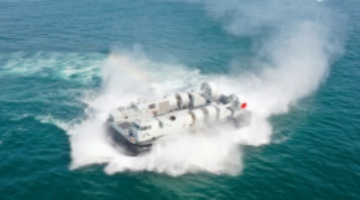By Ding Duo
丁铎
On March 5, the United States Department of State (DOS) issued a statement on the situation in the South China Sea to smear China's policy propositions and hype up maritime frictions, claiming to stand with the Philippines. The statement of DOS can be said to be inopportune and even embarrassing. Philippine President Ferdinand Marcos Jr. said in a recent interview that their actions in the South China Sea are not driven by the US factors.
3月5日,美国国务院就南海事态发表声明,抹黑中国政策主张,渲染炒作海上摩擦,宣称“和菲律宾人民站在一起”。美国国务院的声明有些不合时宜,甚至让人感到尴尬。菲律宾总统马科斯前不久在接受记者采访时说,菲律宾在南海的所作所为“不受美国因素驱动”。
There were three keywords in the US statement: "freedom of navigation", "2016 arbitral decision" and "US-Philippines Mutual Defense Treaty". These were the common rhetoric of the US when mentioning the South China Sea issue in recent years, which are logically untenable in spite of its disorienting impact on the international public opinion.
在美国的声明中,有三个关键词,分别是“航行自由”、“南海仲裁案裁决”和“美菲同盟防御条约”。这三个都是美国近年来在谈及南海问题上的惯用说辞,虽在国际舆论场上有一定的迷惑性,但逻辑上根本经不起推敲。
First, is the situation on Ren'ai Jiao really related to the freedom of navigation?
首先,仁爱礁事态真与“航行自由问题”有关?
Freedom of navigation in the South China Sea has never been a problem. As one of the most significant and busiest waters in the world, the South China Sea has seen intensive navigational activities, with 50% of the world's merchant shipping and one-third of the world's maritime trade passing through it. Irrespective of the changes in the regional situation or the complexity of legal disputes, the normal international commercial navigation in the South China Sea has never been hindered.
南海的航行自由从来都不是一个问题。南海作为目前世界上最重要和最繁忙的水域之一,船舶航行往来活动密集,全球有50%的商船和1/3的海上贸易航经于此。无论地区局势如何变化,无论法律争议多么复杂,南海的正常国际商贸航行从未受到阻碍。
The "freedom of navigation" mentioned by the US in the name of the Ren'ai Jiao situation is a fallacious argument. Firstly, Ren'ai Jiao is part of China's Nansha Qundao, so the delivery of construction supplies to the illegally grounded warship at Ren'ai Jiao by the Philippines is a violation of China's territorial sovereignty and the Declaration on the Conduct of Parties in the South China Sea (DOC), which will inevitably meet with opposition and countermeasures from China. This has nothing to do with freedom of navigation. Secondly, the Philippines had made clear its commitment not to take actions that would complicate the maritime situation in its recent coordination and consultations with China. Nevertheless, it breached the promise by making provocations around Ren'ai Jiao on March 5, which is further eroding its government reputation and national credibility. Thirdly, without regard to the advice, reminders and warnings from China's maritime law enforcement forces, the Philippine transport and coast guard vessels insisted on trespassing into the controlled waters and rubbing against Chinese vessels in a dangerous and unprofessional manner in violation of the Convention on the International Regulations for Preventing Collisions at Sea (COLREGs), threatening the safety of maritime navigation and personnel.
美国借仁爱礁事态所讲的“航行自由”是个伪命题。第一,仁爱礁是中国南沙群岛的组成部分,菲律宾向仁爱礁非法坐滩军舰运送建筑材料,是侵犯中国领土主权和违反《南海各方行为宣言》的举动,必然会遭到中国的反对和反制。这与“航行自由问题”无关。第二,菲律宾近期在和中国的沟通磋商中明确做出过不会采取导致海上局势复杂化的承诺,3月5日菲律宾违背承诺在仁爱礁挑衅,是在进一步透支它的政府声誉和国家信誉。第三,菲律宾运输船和海警船无视中国海上执法力量的劝告、提醒和警示,执意冲闯管控海域,并以危险、不专业方式擦撞中方船只,违反国际避碰规则,是威胁海上航行安全和人员安全的行为。
Second, does the 2016 arbitral decision constitute international law?
其次,南海仲裁案裁决是国际法?
Since the 1970s, the Philippines has illegally occupied eight islands and reefs of China's Nansha Qundao in defiance of international law, the Charter of the United Nations and basic norms governing international relations. The South China Sea arbitration case unilaterally initiated by the Philippines was another attempt to consolidate its illegal gains and infringe on China's sovereignty under the instigation and support of the US.
从上世纪70年代起,菲律宾先后非法侵占中国南沙群岛8个岛礁,违反国际法,违背《联合国宪章》和国际关系基本准则。菲律宾单方面提起的南海仲裁案,是在美国怂恿和支持下,巩固非法所得、侵犯中国主权的又一次尝试。
The core of the South China Sea issue is around the disputes over territorial sovereignty and maritime delimitation. Territorial sovereignty disputes are not within the purview of the United Nations Convention on the Law of the Sea (UNCLOS) adjustment, so controversies related to maritime delimitation have been excluded from the UNCLOS compulsory dispute settlement procedures by China. The arbitral tribunal of the South China Sea arbitration violated many basic principles that should be adhered to by international judicial and arbitration institutions, overstepped its jurisdictional boundaries and failed to correct the Philippines' wrong practice of abusing the UNCLOS dispute settlement system. Judging from the situation in the South China Sea in the past few years, the arbitral award has not only been demonstrated incapable of providing the slightest fair and impartial dispute resolution solution, but has also further exacerbated the already intricate South China Sea issue. The arbitral award is riddled with numerous errors in many areas, such as law interpretation and applicability, factual determination and evidentiary credibility. Regardless of speculations, quotes and commemorations of the US and the Philippines, the arbitral award can neither be incorporated into international law applicable to the South China Sea, nor contribute positively to the development and evolution of the international maritime law.
南海问题的核心是关于领土主权与海洋划界的争议。领土主权争议不是公约调整事项,与海洋划界有关的争议已被中国排除在公约争端强制解决程序之外。南海仲裁案仲裁庭违背国际司法和仲裁机构本应遵循的诸多基本原则,超越自身管辖权管辖,没有纠正菲律宾滥用公约争端解决机制的错误做法。从过去几年南海形势来看,仲裁裁决不仅无法、事实上也没有提供丝毫公平公正的争端解决方案,反而使本已错综复杂的南海问题更加难解。仲裁裁决在法律解释和适用、事实认定、证据采信等方面更是存在大量错误。无论美国、菲律宾怎么炒作、援引、“纪念”,仲裁裁决都不可能成为适用于南海的国际法,更不会在国际海洋法的发展演进中起到任何积极作用。
Third, will threatening China with the US-Philippines Mutual Defense Treaty achieve the desired outcomes?
再次,拿《美菲共同防御条约》威胁中国会有用吗?
The US-Philippines Mutual Defense Treaty is the product of the Cold War, and the Ren'ai Jiao question is a territorial dispute between China and the Philippines, which is irrelevant to the US. The US has repeatedly threatened China and endorsed the Philippines' illegal claims on the pretext of fulfilling the above treaty, which has fostered the gambling mindset of the Philippines.
《美菲共同防御条约》是冷战产物,而仁爱礁问题是中国和菲律宾之间的领土争议问题,与美国无关。美国多次以履行《美菲共同防御条约》来威胁中国,并为菲律宾的非法主张背书,助长了菲律宾的赌徒心理。
The US adopting the "Indo-Pacific Strategy" under the Biden administration has tried to reshape the geopolitical environment surrounding China, regarding China's efforts to safeguard territorial sovereignty, maritime rights and national unity as undermining the status quo and order. Such a judgment is rooted in the ingrained Cold War mentality and hegemonic ideology of the US.
拜登政府在“印太战略”下试图重塑中国周边地缘政治环境,中国为维护领土主权、海洋权利和国家统一所做的努力被美国视为对现状和秩序的“破坏”。此种判断是基于美国根深蒂固的冷战思维和霸权思想。
Over the past year and more, the Philippines and the US have witnessed strengthened strategic coordination and accelerated maritime cooperation. Taking the main forms of maritime situational awareness, joint maritime and air patrols and intelligence system interoperation, the South China Sea security cooperation between the Philippines and the Quad has been rolled out.
一年多来,菲美提升战略协同度,加快海上协作步调。以“海域态势感知”“海空联合巡逻”“情报系统互操作”为主要形式,菲律宾与“四国机制”的南海安全合作已经铺开。
China is also clear about the support, practices and role of the US in roiling the maritime situation on Ren'ai Jiao for the sake of the Philippines. The current continuous moves on the sea by the Philippines are also targeted at testing the reliability of the security guarantee and military support and grasping the tangible advantages on specific issues given by the US.
对于美国在仁爱礁海上事态中向菲律宾提供了哪些支持、运用了哪些手段、扮演了何种角色,中国同样一清二楚。当前菲律宾在海上小动作不断,也是在试图测试美国对其提供的安全保证和军事支持能有多可靠,看看在具体问题上美国能给菲律宾多少实际好处。
(The author is an associate researcher and the deputy director of the Research Center for Oceans Law and Policy at the National Institute for South China Sea Studies.)
(作者是中国南海研究院海洋法律与政策研究所副所长、副研究员)
Editor's note: Originally published on huanqiu.com, this article is translated from Chinese into English and edited by the China Military Online. The information and opinions in this article do not necessarily reflect the views of eng.chinamil.com.cn.









